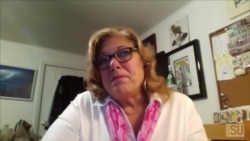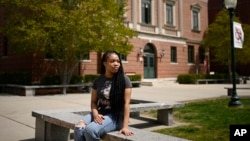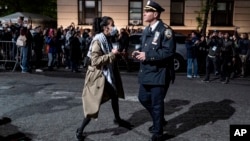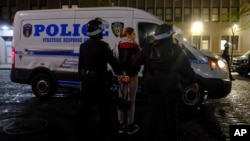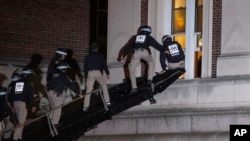Student Union
- By Sal Nicosia
Overly Helpful Parent? You're Helping Your Kid to Fail

For many young millennials, the helicopter parent phenomenon is all too real.
Are parents just overprotective because of how much they love their kids? Or are they living vicariously through them? Or do they love them so much that their children become socially disadvantaged?
As someone who grew up with a helicopter parent, I can say that there is a difference between a cautious, protective parent, and a helicopter.
My personal helicopter-parent journey really began before I was even born. My parents struggled to have a child, but were finally blessed at 40. Having a late baby, my mother (and grandmother) hailed me as a "miracle baby," an only child who was kept secluded and protected.
When it came time to go to school, local public schools weren't considered. I made most of my friends at church, many of whom I am still close to today. I very much fit the only-child stereotype: I enjoyed activities where I usually entertained myself and where my parents knew I was in a safe, non-threatening environment, like being engaged with video games and movies.
My father, Sal, an elevator technician, held a different opinion by the time I came along. He was an athlete in high school and the oldest of three children. His life and childhood were what he saw for my childhood.
But my mom, Caroline, put up much protest. So my dad took a different route, and after his retirement he and I grew close and bonded over our common love of cars. He was less cautious as a parent, allowing me to help with projects and getting my hands dirty with him.
I was sent to a nearby, small private school funded by a Baptist church. My classes were made up of no more than 10 students. As a child, I didn't know the difference. I didn't realize what else was out in the world.
From a young age, while Dad was at work and before I could go out to play, I'd sit with my mom and review spelling and vocabulary words. Like many children, I resisted school. I disliked almost everything about it. Yet she persisted, and I am grateful to her and her dedication to my education. Without the constant jousting we had, I would have become a lazy student, and I owe much of my education to her.
That being said, it boiled over one night my junior year of high school. There was a screaming match, a book was tossed in the air, and that was the last of it. I had outgrown the constant back and forth, and decided I would neglect education her way or pursue it on my own terms.
My graduating class consisted of 35 students in a school of nearly 500 that spanned kindergarten through senior year. As a high-school student, my social growth had been stunted, like many others who grew up with the same 30 kids they'd known their whole lives. There was no room for outside viewpoints. Uniforms were worn, shirts tucked in, ties worn on Wednesdays. Boys and girls were prohibited from commingling.
Contact sports were not allowed. While I understand this may have been to protect other children — I am tall, broad and solid — I wanted to be like my favorite players. But the issue was very open and shut, despite my father's protest. It wouldn't be until college that I would finally play football and hockey in recreational leagues. While it was liberating to finally have these experiences, I reflected about what could have been.
And when it came time for college, I never toured universities. I headed off to my local community college because the cost was much less — we were not a wealthy household — and it wasn't far from home. But after two years and countless dropped classes at community college, I packed my bags and moved 35 minutes down the road to Stockton University in Galloway, New Jersey — with my parents' support.
I lived a mere two miles from where I had gone to high school. I roomed with two lifelong friends I had met at church youth group. I was as focused as I was going to be, and it ultimately paid off: I am scheduled to graduate as a first-generation college student this December.
While I may sound negative regarding my childhood, there were times I relished. My mom loved to cook and I remember assisting her in the kitchen as early as 4 or 5 years old, whether it was as simple as stirring the sauce or as hazardous as cutting vegetables. I was exposed to many foods, and there's very little I won't try. I attribute my diverse palette to her love of food.
The most important part of my childhood with a helicopter parent was when the helicopter landed and the overprotective stipulations finally ended. Around the time I got my driver's license at 17 years old, the grip began to loosen. My vehicle brought freedom and the ability to explore the world on my own, even if it was just my small town in south New Jersey. My love for cars also allowed me to make friends with people who shared common ideals and priorities.
Helicopter parenting is a reaction parents have because they love their kids. That's always how I interpreted it. While there was an arm and a leg of rules to follow, and sky-high expectations to reach for, it was always for my betterment. Looking back now, I wish some things could have been different, but I'm grateful for the experiences I had as I look ahead into my adult life as an aspiring professional.
Tell us about it in the Comments and on Facebook, Twitter, Instagram, and LinkedIn, thanks!
See all News Updates of the Day
Botched US student aid application form rollout leaves many in limbo
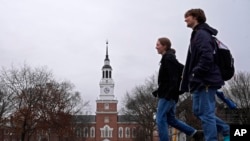
The last thing standing between Ashnaelle Bijoux and her college dream is the FAFSA form — a financial aid application that's supposed to help students go to college but is blocking her instead. She has tried to submit it over and over. Every time, it fails to go through.
"I feel overwhelmed and stressed out," said Bijoux, 19. She came close to tears the last time she tried the form. "I feel like I'm being held back."
Normally a time of celebration for high school seniors, this spring has been marred by the federal government's botched rollout of the new FAFSA application. By May 1, students usually know where they're headed to college in the fall. This year, most still haven't received financial aid offers. Three months before the start of fall classes, many don't know where they're going to college, or how they're going to pay for it.
"We're asking them to make probably one of the biggest financial decisions — and decisions that will have the biggest implications on their lives going forward — without all of the information," said Justin Draeger, president and CEO of the National Association of Student Financial Aid Administrators.
FAFSA, or Free Application for Federal Student Aid, went through a massive overhaul that was supposed to make it simpler and shorter. But a series of blunders by the Education Department made it harder than ever, delaying college decisions by months and raising fears that hundreds of thousands of students will forgo college entirely.
Across the United States, the number of students who have successfully submitted the FAFSA is down 29% from this time last year, and it's even worse at schools with more low-income students, according to the National College Attainment Network.
The group's CEO, Kim Cook, warned members of Congress this month about a potentially "catastrophic" drop in college enrollments that would make the decreases of the pandemic seem mild.
For Bijoux of Norwich, Connecticut, the FAFSA problems threaten to undermine the promise of higher education.
To her, college is a chance to seize the opportunities that weren't available to her mother, who immigrated from Haiti to the U.S. as an adult. Bijoux hopes to become a therapist and set a positive example for her three younger brothers.
If her FAFSA goes through, she should be eligible for enough financial aid to help with the $13,000-a-year tuition at Southern Connecticut State University. If not, she might go to a local community college, but even that would require loans if she can't complete the FAFSA.
"That's why it hurts, because it's like you work so hard to go somewhere and do something and make something of yourself," Bijoux said. "I thought I would start at a four-year (college) and then work hard continuously, like I've been doing basically my whole life. But that's not the case."
The updated FAFSA form has one section filled out by students and another by their parents. But when Bijoux finishes her part, nothing shows up on her mom's online account. She keeps trying, but nothing seems to change.
Similar problems have been reported across the country, along with numerous other bugs that the Education Department has scrambled to fix. Families who call for customer service have faced long wait times or say the call center hung up on them.
It "drains all the momentum" from families working to send their children to college, especially those navigating the process for the first time, said Anne Zinn, a counselor at Norwich Free Academy, where Bijoux goes to school.
"I can only say so many times, 'Just be patient, just be patient,' before they throw their hands up and they're like, 'Why am I doing this? I'm just going to go get a job,'" she said.
The rollout has attracted bipartisan criticism in Congress, and it's being investigated at the request of Republicans. Last week, Richard Cordray, the federal student loan chief who oversaw the FAFSA update, announced he's stepping down at the end of June.
For colleges, too, the delays pose a major threat.
Enrollment decreases like those being projected now could put many small colleges out of business or necessitate deep cuts in staff. Some colleges are pushing for emergency relief just to stay afloat, said Angel Pérez, CEO of the National Association for College Admission Counseling.
"If they don't get checks from the federal government to basically get them through next year, they will not survive," Pérez said.
FAFSA has been the linchpin of student financial aid for decades. It's used to determine eligibility for the federal Pell grant, a scholarship for low-income students, and it's required to receive federal student loans. Colleges and states also use FAFSA to distribute their own scholarships.
FAFSA had long been maligned for being tedious, difficult and intimidating to families without college experience. Congress passed legislation in 2020 meant to simplify the form. The Education Department was ordered to reduce the number of questions from more than 100 to about 40 and change the formula to expand aid to more students.
Problems started piling up as soon as the new form went online in December, already months overdue.
The first applications were incorrectly processed using an outdated calculation for inflation. Later, a federal contractor miscalculated a different formula on more than 200,000 applications. Each mistake added to delays, leaving students waiting longer to hear anything about financial aid.
Even more worrisome is a misstep that blocked students from finishing the form if they have a parent without a Social Security number. Advocates say the system locked out hundreds of thousands of students who are U.S. citizens or permanent residents but whose parents are not.
The Education Department on Tuesday said it's giving those parents a new way to enter their tax information manually. But as recently as this week, some students said they were still blocked from submitting the form.
Federal education officials say they're addressing lingering bugs but making progress. More than 8 million student applications have now been processed and sent to colleges, the agency said, and new applications are being processed within three days.
Still, the wait is far from over. It usually takes weeks for schools to prepare financial aid offers. Some colleges have extended decision deadlines to give students more time to weigh their options. But some stuck to May 1, forcing students to choose a college — and make a nonrefundable payment to hold their spot — without knowing all their scholarship options.
In Baltimore, Camryn Carter is waiting to find out if he'll get a full ride to the University of Maryland or face tens of thousands of dollars in student loans.
A top student and captain of his baseball and wrestling teams, Carter sees college as a step up in life. He thinks back to the times in the grocery store line when he had to put items back on the shelf because his mom couldn't afford the bill. A college degree would give him the stability he didn't always have, the 18-year-old said.
But when he looks at tuition, it's intimidating. Along with Maryland, he's also considering McDaniel College, a private school in Maryland. If he enrolls there, he expects to borrow almost $30,000 a year.
"I try to make the best decisions now so I can have a good future," he said. "I'm a little nervous that things won't work out. But I'm faithful."
- By VOA News
Florida program helps migrant students tutor younger children

The 40-year-old initiative pairs migrant students in high school with elementary school children. High schools earn college scholarship money for their work. (April 2024)
Former students at for-profit Art Institutes are approved for $6 billion in loan cancellation

The Biden administration Wednesday said it will cancel $6 billion in student loans for people who attended the Art Institutes, a system of for-profit colleges that closed the last of its campuses in 2023 amid accusations of fraud.
Saying the chain lured students with “pervasive” lies, the Education Department is invoking its power to cancel student loans for borrowers who were misled by their colleges.
“This institution falsified data, knowingly misled students, and cheated borrowers into taking on mountains of debt without leading to promising career prospects at the end of their studies,” President Joe Biden said in a statement.
The Education Department will automatically erase loans for 317,000 people who attended any Art Institute campus between Jan. 1, 2004, and Oct. 16, 2017.
The department says it's taking action after reviewing evidence from the attorneys general of Massachusetts, Iowa and Pennsylvania, which previously investigated complaints of fraud and sued the for-profit chain.
According to the department's findings, the chain misled students about the success of graduates and about employment partnerships that would help students find jobs.
The chain told prospective students that more than 80% of graduates found jobs in their fields of study, but that was largely based on doctored data, the Education Department said. The true employment rate was below 57%.
Campuses also advertised graduate salaries that were based on fabricated data and included extreme outliers to make averages look better, the department said.
One campus included the annual salary of tennis star Serena Williams to skew the average salary, investigators found. Williams studied fashion at the Art Institute of Fort Lauderdale, Florida.
The chain's tactics led borrowers to borrow high amounts of debt for programs that didn't pay off, the department said.
“The Art Institutes preyed on the hopes of students attempting to better their lives through education,” said Richard Cordray, chief operating officer of the Education Department's Federal Student Aid office. “We cannot replace the time stolen from these students, but we can lift the burden of their debt."
On Wednesday, the Education Department will start emailing borrowers who will get their loans canceled. They won't need to take any action, and payments already made on the loans will be refunded.
At its height, the chain had dozens of campuses across the country, including in New York, Chicago, Miami and Los Angeles. It was operated for decades by Education Management Corp., which collapsed in 2018 after years of legal trouble.
The company reached a $95.5 million settlement with the Justice Department in 2015 over allegations of illegal recruiting tactics. Soon after, it began closing campuses and later sold the remainder to another company.
The final eight campuses were shuttered last year.
The Biden administration has continued to cancel student loans through several existing programs even as it pursues a wider plan for one-time cancellation. That plan is a follow-up to one that the Supreme Court rejected last year.
In total, the Democratic administration says it has approved the cancellation of almost $160 billion in student loans, including through programs for public workers and those defrauded by their schools.
Amid pro-Palestinian protests, Jewish students sue Columbia University for failing to protect them
Tensions on U.S. campuses enter a new phase as a Jewish student files a proposed class action lawsuit alleging students were displaced from Columbia University because its administration could not guarantee their safety. VOA's Natasha Mozgovaya has the story.
- By VOA News
Police arrest pro-Palestinian protesters after takeover of Columbia University building
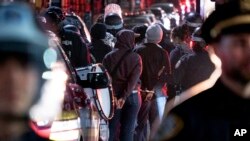
Clashes erupted early Wednesday at a pro-Palestinian protest camp at the University of California, Los Angeles, with counter-demonstrators repeatedly throwing objects and trying to dismantle barricades at the camp. On the opposite side of the country police in New York City cleared a pro-Palestinian protest site at Columbia University where demonstrators had occupied a campus building.
Officials at UCLA declared the protest, which is seeking to have the university divest from Israel, to be unlawful and in violation of university policy. The protesters and counter-protesters were initially apart from each other late Tuesday, but the situation turned more violent in the early morning hours as the counter-protesters shot fireworks, advanced on the camp barricade and repeatedly launched objects at the protesters.
There were small clashes between the two sides in front of the barricade, and while police deployed to the area at the request of university leaders, officers did not immediately separate the two sides.
In New York, police equipped with helmets and riot shields arrested dozens of pro-Palestinian protesters at Columbia University and others at The City College of New York about 20 blocks away.
A Columbia spokesman said in a statement the university’s administration decided to call in police in order to “restore safety and order to our community.”
“We regret that protesters have chosen to escalate the situation through their actions,” the spokesman said. “After the University learned overnight that Hamilton Hall had been occupied, vandalized and blockaded, we were left with no choice.”
A Columbia University faculty group criticized the administration’s decision to turn to police, saying faculty members had tried for two weeks to intervene and defuse the situation only to be rebuffed by university leaders.
"NYPD presence in our neighborhood endangers our entire community. Armed police entering our campus places students and everyone else on campus at risk,” said a statement from the Columbia University Chapter of the American Association of University Professors.
The faculty further said it would hold the university’s leaders “responsible for the disastrous lapses of judgment that have gotten us to this point."
Protesting Israel's war in Gaza and demanding university divestment from the country along with amnesty for demonstrators, students entered Hamilton Hall early Tuesday, hours after the university began suspending students for refusing to take down tents at a nearby protest site.
Hamilton Hall has been central to protests at the university since the 1960s.
White House National Security Council spokesperson John Kirby told reporters Tuesday that President Joe Biden believes students occupying an academic building is “absolutely the wrong approach,” and “not an example of peaceful protest.”
Democratic Congressman Jamaal Bowman, who represents a New York district near Columbia University, called on the school to stop what he called a “dangerous escalation.”
"Educational institutions should be spaces to nurture critical thinking skills and learn to work together with diverse communities to enact a more just and peaceful world,” Bowman said in a statement. “The militarization of college campuses, extensive police presence, and arrest of hundreds of students are in direct opposition to the role of education as a cornerstone of our democracy."
The Columbia student radio station WCKR reported that all student journalists were escorted away from Hamilton Hall, and that later they were threatened with arrest if they left the Pulitzer Hall building that houses the university’s journalism school. Still, the student journalists continued to broadcast and report on what was happening.
Due to a significant number of online listeners, WCKR experienced intermittent outages and had to lower its sound quality in order to accommodate increased demand.
Shortly after police carried out arrests at Columbia, officers also arrested pro-Palestinian protesters at The City College of New York, located about 20 blocks north of Columbia.
Building takeover
Facing calls to resign over how she has handled the protests, Shafik released a statement Monday condemning calls for violence and reiterating the university's commitment to "academic freedom and to ensuring that all members of our community have the right to speak their minds."
Insisting Columbia will not divest from Israel, Shafik said the school has instead "offered to develop an expedited timeline for review of new proposals from the students by the ... body that considers divestment matters."
After smashing through glass door panels and chaining them shut, students draped a banner reading "Hind's Hall" from an upper floor. Protesters have identified Hind as "a 6-year-old Palestinian child murdered in Gaza by the Israeli occupation forces funded by Columbia University."
Israel denies targeting civilians in its war against Hamas, alleging that militants are using civilians as human shields. More than 35,000 Palestinians have been killed in Israel's assault on Gaza, many of whom are women and children, according to Gaza's health ministry.
Israel launched its offensive in response to an Oct. 7 Hamas attack on Israel that killed about 1,200 people and saw some 250 taken hostage.
Three hours after students commandeered Hamilton Hall, Columbia University issued a notice that the campus would be closed to all except for residential students and essential employees.
Nationwide demonstrations
Students have been protesting Israel's war in Gaza on campuses throughout the country. Dozens of students were pepper-sprayed and arrested by police on Monday at the University of Texas at Austin, while students at California State Polytechnic University, Humboldt, in Arcata, California, were detained early Tuesday.
Protesters and administrators at Brown University in Rhode Island reached an agreement Tuesday for demonstrators to close their encampment in exchange for a commitment by the university to vote in October on whether to divest from Israel-linked funds.
U.N. human rights chief Volker Türk expressed concern over the force being used against protesters throughout the United States, saying, "Freedom of expression and the right to peaceful assembly are fundamental to society."
U.N. Secretary-General Antonio Guterres called it "essential in all circumstances to guarantee the freedom of expression and the freedom of peaceful demonstration."
"Hate speech is unacceptable," he said, adding that it is up to the university authorities to manage the unrest.
Chris Hannas and Liam Scott contributed to this report. Some information in this report came from Reuters, The Associated Press and Agence France-Presse.




